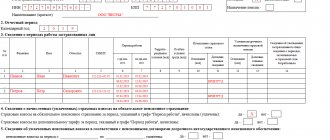The well-known expression “Personnel decides everything” is based on many years of experience of the most successful companies.
The direct dependence of profit growth and the company's image on the professionalism of the staff is undeniable. When it comes to forming a team, you should not rely only on luck.
Famous companies, understanding the complexity and responsibility of this issue, turn to professionals. Recruiters are employees of recruitment agencies who are involved in the formation of a team “face to face” or on specialized Internet sites, personnel selection databases, etc.
This article will talk about interview techniques, the stages of preparing for an interview and its high-quality conduct. How to build a dialogue about hiring and how to structure the process of conducting a survey to get the maximum benefit for your company.
Create an image in your mind of a new employee
First of all, it is worth clearly representing the suitable candidate. Selection criteria must be described. Here, perhaps, it is worth deciding on your appearance, personal qualities, education, and work experience. Marital status and having your own car can also become an important factor in the issue of accepting an applicant for a vacant specialty.
The next step in preparing for a personal meeting is announcing an open vacancy at your company. They place advertisements, most often on Internet sites and in newspapers. Personal acquaintances and connections between you and your team can also be of great help.
The logical next step is the selection of “unsuitable” candidates. We are talking about “sorting” resumes. There is a certain percentage of people who want to find a job, guided by the same “what the hell is it, maybe you’ll get lucky.” If you set yourself the goal of finding a professional, you should not waste time interviewing candidates who are initially unsuitable for you.
And most importantly, before your meeting takes place, you should clearly understand the following:
- You are interested in a manager, leader and proactive curator or performer, a member of a team already formed by you or the team, the so-called missing link;
- What human and professional qualities should the candidate have;
- What tasks are set for the new employee;
- What goals will be achieved by the company if it receives a vacant position, etc.
You think through everything down to the smallest detail.
What not to ask
During the interview, the applicant should refrain from asking the following questions:
- General information about the organization and the specifics of its activities. They can tell a potential employer that the candidate has not prepared for the interview and has not learned which company he will be working with. The employer may conclude that the applicant is not interested in the job.
- Wage level. Of course, it is important to know what the applicant can expect. But such questions need to be asked carefully so that the employer does not think that the salary is all that interests him.
- Requests to the employer. If the applicant has any special conditions or specific requirements, you should not voice them from the first minutes of the interview. The first thing to do is to interest the employer.
- Personal questions. They may relate to marital status, employer income level and other personal topics. Asking such questions is tactless.
- Work details. In any case, the applicant will have small details that require clarification. They can be asked during the performance of job duties or at subsequent interviews.
How to conduct an interview correctly
Recruitment agencies have practicing psychologists on their staff. And this is no coincidence. Scientists have repeatedly proven that an opinion about a person is formed within 3-5 minutes from the start of communication.
During this period of time, your subconscious, regardless of you, will create a sketch of the qualities of a candidate for a vacant position. This will help you in the future understanding in what direction it makes sense to continue your conversation. And, in fact, is it worth it?
Where to start an interview and how to conduct it correctly
If you have a clear idea of what qualities an employee should have, you will form an opinion about the interviewee as quickly as possible.
You should not start your dialogue with what kind of employee you are looking for. In order for the candidate to open up, it makes sense to start communicating on a completely abstract topic: about the weather, about nature, about the situation in the world.
The consequence of such an informal conversation will be the erasing of the invisible line between you, which in turn will help each of the interview participants feel much freer. You will get certain ideas about the person in front of you, about his communication skills and ability to conduct a dialogue, present and advertise himself, and therefore your product or service.
What small businesses need to know about remote work
Decide on the format in which it will be held
| Interview Format | ||||
| № | Format | Characteristic | Main differences | Popularity |
| 1. | Interview via Skype | It is carried out if the manager wants to determine for himself whether he should invite this candidate to a personal meeting | Suitable for recruiting freelancers, employees for remote work, etc. | 1 |
| 2. | Interview, identifying competencies | A template of the requested competencies is created | The evaluation system determines whether the applicant is suitable for the vacancy | 2 |
| 3. | Situational interviews | The situation is played out, the occurrence of which is most likely | Purpose: to find out the professional and personal qualities of the interlocutor; understand whether it corresponds to the format of communication in resolving certain problems in the enterprise | 3 |
| 4. | The interview is stressful | Unbalancing the candidate, getting a real picture of behavior in an unusual situation | It is carried out using psychological techniques. Purpose: to determine the degree of endurance of the respondent, the ability to control oneself and withstand stressful situations with dignity, psychological impact | 4 |
| 5. | Structured interview | Creating a quality interview template and plan | The manager formulates questions. The interview is conducted strictly according to plan. It is possible to use a quick survey | 5 |
Interview techniques
| Interview Techniques | |||
| № | Method | Characteristic | Main differences |
| 1. | Stressful interview method | Goal: determine the applicant’s endurance threshold | Abuse of such a technique can be detrimental to the company’s image. |
| 2. | Situational interview method | Acting out a “sketch” - a model of behavior of a company employee in a given situation | The manager plays the role of the client, and the interviewee is the manager for the sale of goods manufactured by the enterprise |
| 3. | Prospective or simulation interview method | The goal of this method is to create a model of behavior by the interlocutor for a clear understanding of how he will behave in the future. | Very similar to the previous method, with the difference that only the candidate for the vacant position plays the role, but not the survey leader |
| 4. | Retrospective interview method | Goal: to clarify the picture of the interviewee’s relationship with the previous management and team | Objective: obtain the maximum amount of information from the respondent. Design it for a new workplace. |
Should you pay attention to the appearance of a potential employee?
Necessarily! Imagine that a person who appears before you in an unironed suit or with too bright makeup and a flashy hairstyle will become a member of your team, and, accordingly, a representative of the enterprise. How will its appearance affect the overall picture of the office? How will his image fit into the company's image?
It is necessary to inform the candidate that the requirements for the appearance of any employee is a very important issue for the image of the enterprise. This point should also be written down in the job descriptions of all company employees.
Focus on your answers, not the employer's thoughts.
It is impossible to predict the employer's questions and train of thought. Maybe he tests your knowledge of the automotive industry with a question about yellow cars in the Czech Republic, and gives case studies to check how coherently you express your thoughts. It's better to focus on your answers and do your best to get an interesting job.
And most importantly, try to be sincere. Let's say you successfully pretend to be a completely different person in your desire to get this job. And then it turns out that this job (neither its functionality, nor the peculiarities of the internal culture in the company) really suits you at all. Was it worth cheating?
And remember - you are also evaluating the employer. Ask questions that are important to you. Not only about the salary and work schedule, but ask more about the functionality itself, about how and what the company works, what the special features are, and why the vacancy opened. For some reason, many people think that this can scare them away. On the contrary: recruiters and managers who conduct interviews often complain that candidates don’t ask much and nod to everything. In fact, your questions show your interest and serious approach to choosing a job - and this in itself is an advantage.
Good luck with your interview!
How to formulate questions correctly
It is important to remember that the reputation of the company depends on the quality of the interview you conduct.
Thinking through all the details and little things will be to your advantage.
You should not conduct an interview in a random place. It would be much more respectable to receive the interviewee in your own office at a clearly designated time. Punctuality is an indicator of success and proper organization of working time.
Following the advice of psychologists, start communication with an abstract topic and only after a short introduction proceed to the very process of conducting a constructive dialogue.
How to invite a candidate by phone?
So, you liked the candidate’s resume for the position you are holding, and you decided to invite him for an interview. The best way to do this is by phone.
Example of a dialogue plan:
- Say hello;
- Introduce yourself, state your name and the name of the company where you want to invite the candidate;
- Having indicated the purpose of the call, ask whether communication is convenient at the moment;
- Tell us a few words about what the company does and what position you want to invite the person to fill;
- It is important to ask “burning questions” at the stage of the telephone interview: where the person lives and is it convenient to get to the office, clarify skills and experience;
- If you are satisfied with the telephone stage of interviewing, then you can safely invite the person to an interview in the office . It is best to offer to send the address and directions to him by email.
It is good practice to let the candidate choose the time for the interview and the day of the week.
What to ask a candidate during an interview
— You should prepare an outline for your meeting or series of meetings in advance.
Structure your questions: they should be competent and logically structured. Also, the interview should be conducted in two directions of your research as a candidate for a vacant position. You are equally interested in his professional and personal qualities.
— You need to clearly think through the interview plan and the sequence of questions asked. It is worth having an example of your interlocutor’s resume in front of you. It is also very advisable to familiarize yourself with it in advance, and not read it in front of the interviewee.
— Create your own questionnaire template, in which, during the interview, your comments, abbreviated answers, and features of your communication will be entered. As soon as the interviewee leaves your meeting place, be sure to include your opinion regarding the interview in the “Notes” column.
- Offer your interlocutor a leading role. Let him tell you what he considers most beneficial in his professional and personal qualities. You will note for yourself whether the person in front of you is literate, how he behaves at the time of his own advertising, whether he knows how to formulate his own thoughts, etc.
- Also take an interest in his tastes, interests, outlook on life (your task is to understand whether the person in front of you is positively or negatively inclined, how his mood can affect the mood of the team).
— Find out what attracted the respondent to the activities of your organization.
- Determine the weaknesses and strengths of the person in front of you by asking him a direct question: “Describe your pros and cons of character and professional qualities.”
— Ask about your previous place of work, relationships with colleagues and superiors, and the reason for leaving. Your task is to hear how flattering the respondent is about their previous workplace and what goals they have set for themselves.
— A logical continuation of communication would be to ask the candidate about the availability of other job offers.
— How he sees the future activities of your enterprise with his participation. Invite your interlocutor to describe his activities as an employee. What positive contribution will he bring to the development of the company?
— Marital status and the presence of children will give you the opportunity to determine the degree of responsibility of the candidate and his interest in getting this job.
— If the applicant is involved in sports, then the conclusion suggests itself: this person will be a disciplined and responsible performer.
If the interview process leads you to the point that you are interested in the candidate as a potential employee, then it makes sense to find out more about him and move on to the second, completely optional, part of the conversation.
The script for your meeting can be supplemented with “secondary”, non-traditional or additional questions.
— Do you have any specific ideas regarding joining the team?
— How will your colleagues from your previous place of work describe you?
— What qualities do you want to change in yourself?
— What book character do you associate with in life?
— Is there a book that has become your reference book?
— Describe yourself from the outside, describe your usual daily routine?
— Is playing sports your strong point? What sport are you interested in and why?
— The range of interests of your friends and acquaintances.
— Play the game “What is more important.” Career or salary, distance of the workplace from home or the desire to develop as a person, the need to spend a vacation with family or give it up in favor of a successful deal, etc.
— Also ask whether the interlocutor will perform duties that are not prescribed in his job description. And what approach will they take?
At the same time, if you are interviewing a manager, you need to find out whether the candidate for the declared position can distribute responsibilities among his subordinates.
— Invite the applicant to describe his dream job, insist on the most colorful description of every detail.
- Let him describe the job responsibilities that bring him maximum pleasure.
— How does he plan to build his relationships with wayward colleagues, with colleagues who a priori cannot become his supporters, but will become his oppositionists.
It is fundamentally important not to give hints to your interlocutor. Let him talk a lot, and you draw your own conclusions. Do not use leading questions, and especially do not voice hypothetical answers, do not compare the candidate with previous ones out loud.
You should also not voice your conclusions regarding the respondents’ answers. Let the interviewee remain ignorant of your opinion of him for as long as possible. This will either allow the applicant to talk, or give you the opportunity to understand that the candidate in front of you is not capable of conducting a quality dialogue.
If you understand that this is not the person the company needs, you should not continue this useless conversation. Thank the interlocutor for his time and interest in your company, and gently say goodbye.
Also watch his body language. A lot of literature will give you certain concepts on how to recognize the level of sincerity of a candidate for a position.
It’s no secret that many heads of human resources departments or direct directors of companies resort to the trick of “extracting” trade secrets from a previous place of work from the interviewee. It is up to you to decide whether these kinds of questions should be raised at the first personal meeting. Let us only note that the willingness to “sell away” all knowledge is a bad sign.
Ask for contact details of employees and managers of the candidate’s previous place of work if reference documents are not provided along with the resume.
The time has come to ask how highly the person who appears before you values himself.
Often, if this is a truly qualified specialist, he will value himself somewhat more expensive. Your desire to “bargain” will be absolutely appropriate. Perhaps additional benefits or your proposals will be much more interesting for your interlocutor than the amount he previously stated.
You need to end the conversation again on a relatively abstract topic. For example, ask about the interests and hobbies of your interlocutor, his hobbies in his free time from work.
How to refuse a person?
After analyzing the selection criteria and making a negative decision on the candidate, send him a notification email or call him personally. According to the survey results, electronic communication is the most preferable and convenient for both parties .
It must be remembered that, within the framework of the current legislation of the Russian Federation, an applicant can be officially refused a job for only one reason: the discrepancy between his professionalism and the requirements put forward by the employer!
The tone of the notification in the letter should be positive. It is a good idea to thank the candidate for their time spent interviewing. Remind that there were a lot of candidates for the declared position and your choice was not an easy task.
In the correct form, citing his valuable but insufficient experience, gently refuse. In conclusion, it should be noted that his resume is interesting to you and if there is a suitable vacancy, it will be considered.
This simple gesture of courtesy will show that you value all candidates and care about your image .
Questionnaire Formulation
It is very important not to construct complex questions, not to introduce many clarifying sentences into one construction. Your task is not to confuse the person being surveyed, but to get the most open picture of what kind of person is in front of you.
If you plan to persuade the applicant to give the positive answer you need, only then ask so-called closed questions.
Clarifying questions are also very necessary in the dialogue. We are talking about both negative and positive conclusions of the interviewer. Also keep a balance of negative and positive emotions, without revealing your attitude towards the candidate's answers.
The psychological technique “Question-answer mirroring” is very effective if you suspect the applicant of insincerity.
It is as follows: the interlocutor voiced an affirmative sentence, you, in turn, a few remarks later, voice the same phrase, but in a question format.
Try also using a quick survey technique. This is a very effective technique that does not give the interlocutor the opportunity to think for a long time, but takes him by surprise at some point.
Final stage of the interview
At the end of the interview, the applicant must thank the employer for his time and agree on a time frame for making a decision. An active candidate must independently take the initiative to obtain a final decision on hiring, and not languish in anticipation.
At the end of the interview, the employer needs to summarize what issues mutual understanding was reached between the parties. He must clearly indicate what the candidate can expect and when the final decision will be made. If it is said that he will be notified by phone, then if the decision is positive, as well as negative, you should call and be sure to tell the result, because the person will wait.
As a result of each interview, the employer must conduct an in-depth analysis based on his notes on each candidate individually. How can an employer conduct a job interview effectively so that the candidate ultimately gets the job he wants? The answer to this question is revealed as much as possible in this article.
Conclusion
After reading the above materials, you may think that the process of interviewing candidates for a vacant position is an unreasonably long, painful and endless process.
In fact, it certainly requires your careful preparation and a competent process for carrying it out.
Be guided, first of all, by the fact that in the case of a professional approach to the interview, the enterprise team and the entire company as a whole will only benefit, and accordingly, profits will show consistently positive dynamics.
This means, in fact, “Personnel decides everything!”
Questions to test your wits
Sometimes an interview question is perplexing. For example:
- “Why are sewer manholes round?”
- “What would you do if you were shrunk to the size of a coin and found yourself in a mixer that would start working in a few minutes?”
- “How many yellow cars are there in the Czech Republic?”
There is no correct answer to these questions. The employer just wants to know exactly how the candidate will reason. This is important for positions in which new solutions must be proposed, rather than performing routine operations according to instructions. Take a break and think about your answer. Here it is important to simply speculate on the topic - say, compare the number of inhabitants of the Czech Republic with the total number of cars and the popularity of yellow, and the like: it all depends on your imagination and sense of humor. The main thing is not to get lost and express your assumptions, even if no one knows the exact number of yellow cars in the Czech Republic.
Question 9: Tell us about your family
Ask if the candidate has a family, if there are problems in it, whether they will interfere with the work. Sometimes problems help an employee make progress. For example, he does not have his own home, he rents an apartment. It must be paid, so the employee will do everything to ensure that his salary is decent, making serious efforts. The same positive aspect can be all kinds of loans, growing children (by the way, they can also become the reason for permanent sick leave, so find out if there is someone to leave them with in case of illness), etc. Let the employee draw conclusions whether the family will be against it business trips, travel, evening and night work (if provided for by the schedule).
Question 10: How do you imagine the prospects of working in our company?
The favorite question of all employers is where do you see yourself in our company in 5 years. You need to understand that a person may not know what your staffing structure is, and it may not be at all accurate to name the prospects for his growth. Make sure that in principle he has thoughts about growth. Moreover, if these are not memorized phrases, but his real thoughts, then he will talk about his plans in detail, with numbers, with plans for where he will spend the money he earns, where he will go, what he will buy. The more specific the story, the greater the chance that this particular employee will achieve success at work.
Question 2: Tell us about your problems
Ask the candidate’s opinion about his life, what suits him, what seems difficult, what he wants to change, what measures he takes to achieve this, how easily he makes decisions about changes in life and how quickly he implements them. As you answer, pay attention to whether the person blames himself for his troubles, or everyone around him. If he has a lot of problems and they seem insoluble to him, then this is a bad sign. A good employee will present his problems with optimism and immediately say how he intends to solve the situation or has already begun to take concrete actions to do this.
Ask an additional question - how often are there joys in his life, and what kind? If he cannot remember joyful moments, then you have a pessimist who is unable to create joy for himself. If he begins to blame everyone around him for the lack of joy and positive moments, then know that the candidate will not be held accountable for anything in his work, he will blame failures on you, and he will also create a corresponding mood for other employees.
If a person tells you that there are many joys, and names them, even the smallest ones, then this is a good sign. He will always be ready to cooperate, he will believe that everything is possible, that everything will be fine, which will significantly help in his business and will increase the working tone of the entire team.
“When have you ever had to make a decision without having all the information you needed?”
What it tests: independent decision making.
It is easier to manage remote employees who can be trusted to make some decisions independently. The best ones take the time to look at the big picture and understand what needs to be optimized at all costs. They are also flexible thinkers and can evaluate trade-offs objectively.
Talking about how a person made a decision without having all the necessary information to make it allows for a better assessment of this skill. The situation shows what information the candidate was looking for and what information he considered not the most important. Consider whether he thought about the impact of his decision on clients and other stakeholders, not just himself or his team.
Question 1: tell us about yourself
As a rule, at the beginning of the conversation, the candidate is asked to tell about himself. When he answers a question, take notes. Do not write down where and when the candidate worked, this will be written on his resume, and you can look at these records at any time. It’s better to note how the candidate speaks, how he tells his biography, in order, as written in the resume or with comments in which he focuses on his professionalism in the field in which he is applying for a job with you.
It’s good if he emphasizes why he wants to work for you and how strongly he wants to take the position. It is good if a specialist tells only the main points that indicate his level of training and qualifications, does not dwell on unimportant details and does not include emotions. Ask him to provide facts that speak of responsibility, decency and hard work. Clarity and brevity of thoughts indicate readiness for thoughtful and precise work. Calmness and confidence during an interview is also a significant advantage; this indicates a high level of professionalism and understanding of the matter.
“How would you start a new project from scratch?”
What it tests: leadership qualities.
Even if the position is not managerial, leadership skills are still important, especially if your company often has individuals in the role of project manager.
Leading remotely means carefully planning coordination and communication. Listen carefully as the applicant builds a business case for the project and convinces the management team to give it the green light. How will he assemble a team for the project after this? A good remote worker will instinctively think of all the functions and skills needed for a project, and will not hesitate to bring in other teams when necessary.









